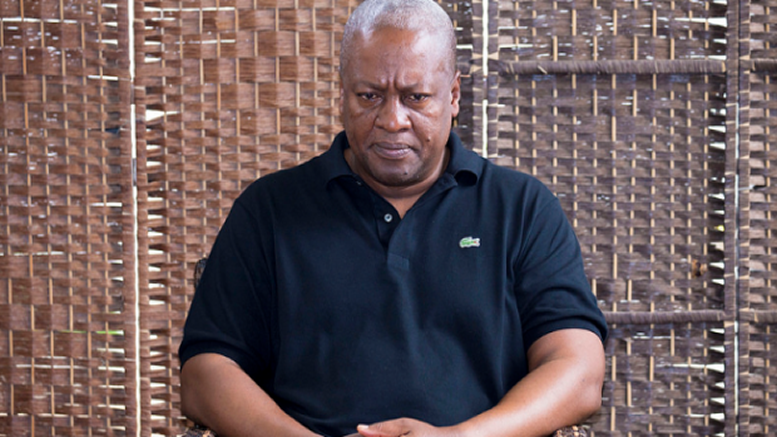Akufo-Addo shouldn’t be running for president – Mahama
The 2020 NDC flagbearer, John Mahama, has asked President Nana Akufo-Addo to resign over the government’s handling of the fight against illegal mining.
He said despite President Nana Akufo-Addo’s promise to end the menace, he has failed.
“If he has put his tenure on the line then he probably shouldn’t be running for the next presidency, he should be resigning by now,” Mahama told a team of Multimedia reporters during an interview.
Mahama’s comment was in reference to the president to his own words when he outdoored a militarised campaign, Operation Vanguard, in July 2017 to clamp down on the sustained degradation of land and water bodies caused by illegal mining
Photo: Defence Minister, Dominic Nitiwul interacting with the Operation Vanguard team.
“I have said it in the Cabinet, and perhaps this is the first time I am making this public, that I am prepared to put my Presidency on the line on this matter.”
“It will be a betrayal of the trust imposed on me if I fail to end this,” the president declared.
At least 400 soldiers and police officers were distributed across Ghana’s mining zones to tackle the canker.
More than three years after the fight, the results have been mixed.
Several arrests have been made and equipment seized. Dozens of foreigners have also been deported, prominent among them was Aisha Huang, a Chinese national described as Galamsey Queen.
There were some initial reports that a muddy river Ankobra in the Prestea Area in the Western Region had regenerated itself, a testament to the reduced degradation.
The government has also said it is working to provide alternative livelihoods to persons engaged in illegal mining.
But the much-publicized fight was rocked by corruption scandals including a statement from the minister tasked to supervise the fight, Prof. Frimpong Boateng who said 500 seized excavators had gone missing.
New Patriotic Party’s Central Regional Vice Chairman, Horace Ekow Ewusi was arrested by the Criminal Investigations Department (CID) for his alleged involvement in the disappearance of some excavators seized from illegal miners in the country.
Photo: Professor Kwabena Frimpong-Boateng, the Minister for Environment, Science, Technology & Innovation and also Chairperson for the Inter-Ministerial Committee on Illegal Mining (IMCIM)
Commander of Operation Vanguard Colonel, William Nortey, decried the slow rate of prosecution of arrested illegal miners. In February, he lamented that only about 5 percent of over 2,000 illegal miners caught have been prosecuted.
Local Government Minister, Hajia Alima Mahama called on Ghanaians to exercise patience with the government, stressing the restoration of Ghana’s water bodies would take time.
“This will not happen in a day or in a year,” she said and pointed to Germany’s struggles to restore water bodies destroyed during World War II.
“Germany took 30 years to clean their water bodies,” she said. Operation Vanguard has since been withdrawn.
While the government claims it has chalked significant feat, the opposition has said the fight has failed.
There is little independent assessment of the fight.
John Mahama who was president between 2012 and 2017 said under the NDC government it came to a conclusion that putting boots on the ground “didn’t lead to anything positive.”
“That is not the right way to do it. You cannot use the force of arms to combat illegal mining,” he said.
History of military operations against illegal mining
In a presentation by Executive Director of Centre for Social Impact Studies, Richard Ellimah summarizes the history of military interventions in the fight against illegal mining.
It is titled ‘From Operation Flush Out to Operation Vanguard: Issues and Lessons’
In the late 1980s, the first recorded nationwide operation against “illegal” mining was undertaken. This was immediately after the passage of the Small Scale Mining Law, PNDCL 218, 1989.
Another security crackdown on “illegal” mining took place in November 2006. This was famously codenamed “Operation Flush Out.” This was a massive operation across the country.
It led to widespread human rights violations in mining communities across the country. Some “illegal” miners lost their lives, others were permanently maimed, and others had to flee their own communities, never to return.
Operation Flush Out received a mention in one of the reports of the UN General Assembly:
“Security contractors of mining companies assisted by armed police and soldiers often conduct “operations” ostensibly to arrest alleged illegal small scale mining operators (galamsey) in the concessions of large-scale mining companies.
These “operations” tend to be violent and bloody invasions of communities resulting in gross human rights violations. Since November 2006, the military and police have been conducting a country-wide operation named ‘Operation Flush Out’, during which hundreds of galamsey were forcefully removed from the land they were working on. An unknown number of galamsey has been shot, beaten and maimed by members of the private and state security forces.” (Report of Human Rights Council to the UN General Assembly, April 2008)
In 2013, following a lot of public outcry, the government sanctioned another security operation.
Under the banner of “Inter Ministerial Taskforce,” the key objective was to deal with foreign invasion in small scale mining.
Unfortunately, Ghanaian owned small scale mining companies were affected. Mining equipment were seized and burnt in some instances.




 Photo: Defence Minister, Dominic Nitiwul interacting with the Operation Vanguard team.
Photo: Defence Minister, Dominic Nitiwul interacting with the Operation Vanguard team.